| Article ID | Journal | Published Year | Pages | File Type |
|---|---|---|---|---|
| 4496903 | Journal of Theoretical Biology | 2011 | 8 Pages |
We model the evolution of the division of a resource between two individuals, according to a bargaining mechanism akin to the ultimatum game, in which a dominant proposer makes an offer that his partner can only accept or refuse. Individuals are randomly drawn from an infinite population and paired two-by-two. In each pair, a proposer is chosen. The proposer offers a division of resources to his partner. If the offer is accepted it is implemented; otherwise both partners pay a cost and move on to the next social opportunity. When the role that individuals play in each interaction is chosen at random, our analysis shows that each individual receives a fraction corresponding to at least 1/2−c1/2−c of the resource at evolutionary equilibrium, where c represents the cost of postponing the interaction. A quasi-fair division thus evolves as long as c is low. We show that fairness, in this model, is a consequence of the existence of an outside option for dominated individuals: namely the possibility of playing on terms more favorable to them in the future if they reject the current interaction. We discuss the interpretation and empirical implications of this result for the case of human behavior.
► We model the evolution of sharing in the ultimatum game. ► If an offer is rejected, the two partners move on to another social opportunity, with a different partner. ► Individuals never accept offers below their expected payoff under this “outside option”. ► This constraint yields the evolution of a fair sharing.
